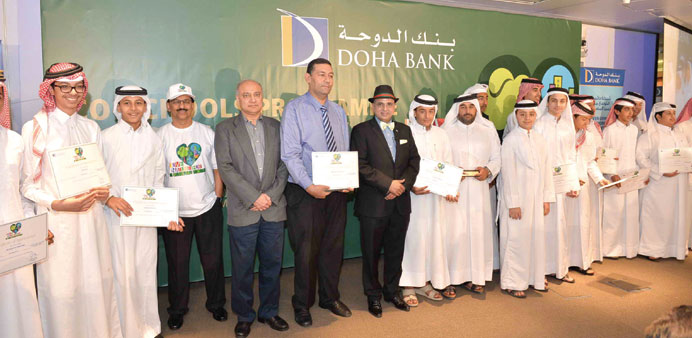Participating students and teachers receive certificates made out of recycled paper.
Doha Bank has presented 11 Qatar schools with the Eco-Schools Programme awards yesterday in recognition of their commitment to sustainable practices and for developing innovative solutions to everyday environmental challenges.
The awards recognised schools that played an active role in propagating the concept of eco-consciousness among students and demonstrated a high degree of innovation and creativity in completing their green projects as part of the Eco-Schools
Programme.
In 2014, the winning schools received an Eco-Star Trophy in several categories. The following received the Eco-Star trophies for the “environmental health” category: MES Indian School for their “Campus Care Force” project, Shantiniketan Indian School (Green School Garden), Pakistan Education Centre (Solution to Improve Environmental Health), and Philippine International School Qatar (Laughing Dove Retreat).
In the “energy saving” category, Bhavan’s Public School received a trophy for reducing the use of electricity, water, in the campus and at students’ homes while in the “water management” category, Philippine School Doha received the award for using air-conditioning condensate to water a vegetable
garden.
Five schools received the Eco-Star trophies for the “waste management” category: Ahnaf Bin Qais Independent Preparatory School for their “Managing Waste” project, Birla Public School (Best Out of Waste), Philippine International School Qatar (Plastic Bottle Reduction and Recycling Programme), Al Tamakon for Comprehensive Education (Creative Arts from Waste), and Doha Modern Indian School (Waste No Waste).
Aside from Eco-Star trophies, certificates made from recycled paper were distributed to participating students and teachers.
Organised by Doha Bank, the Eco-Schools Programme encourages children to become environmental advocates to provide a platform for schools to contribute to environmental protection by implementing effective measures to reduce their overall carbon footprint.
Dr R Seetharaman, Group CEO, Doha Bank, said: “The challenges of food security, eradicating extreme poverty, and providing enough water supply remain in the achievement of sustainable
development.”
He said banks should earmark risk weighted capital towards “green banking” or “clean development mechanism” or sustainable development projects taking into consideration the carbon emissions.
“As a forward-thinking and socially responsible citizen, Doha Bank has embraced sustainable business practices to satisfy customers and promote solid environmental stewardship,” he added.
Seetharaman stressed that environmental stewardship is one of the pillars of Doha Bank’s corporate social responsibility (CSR) efforts.
The Eco-Schools Programme guides student action teams within schools on their journey towards sustainability by providing a framework to help embed these principles into the heart of school life. It offers flexibility, allows creativity, and encourages innovation on how the school plans to transform itself into becoming an eco-friendly institution.
For its core process, schools are asked to create a framework for student action and to make a commitment to the Eco-Schools Committee. Once approved, the schools implement the action plan, review, and continue the process. The committee later monitors the progress and awards Eco-Stars to successful schools and projects.

